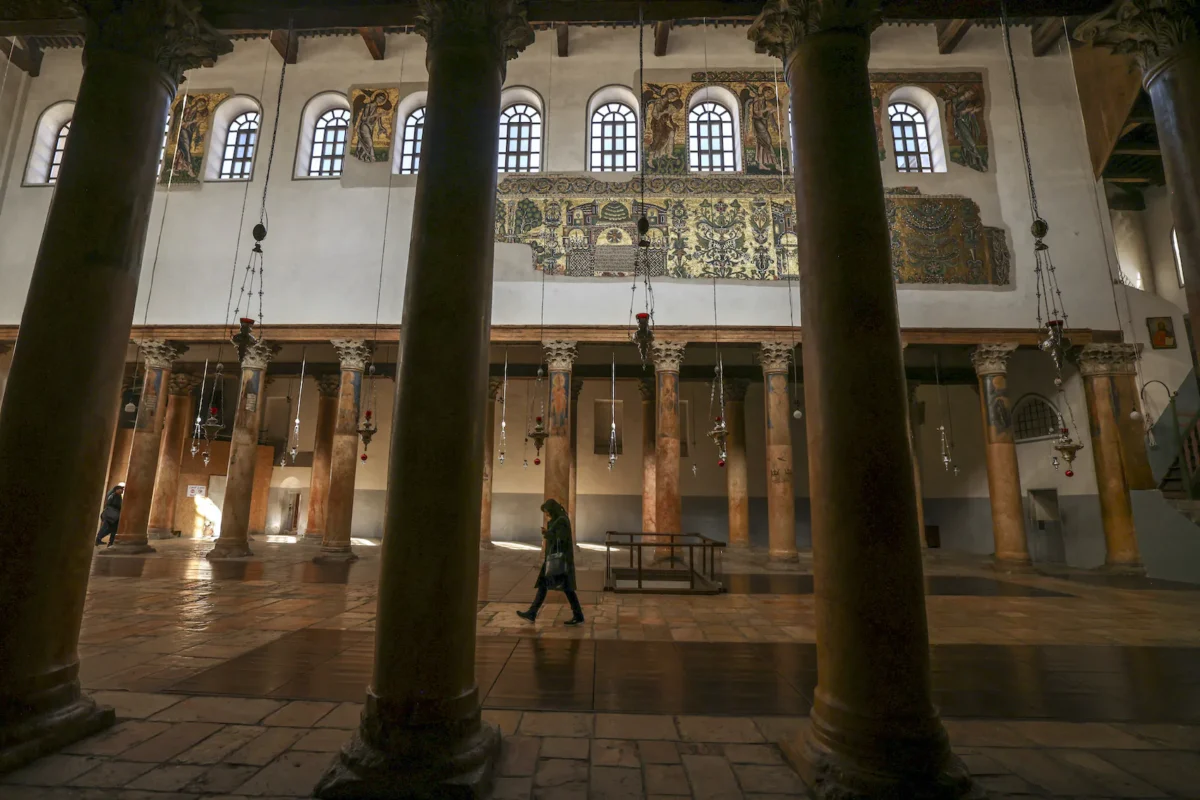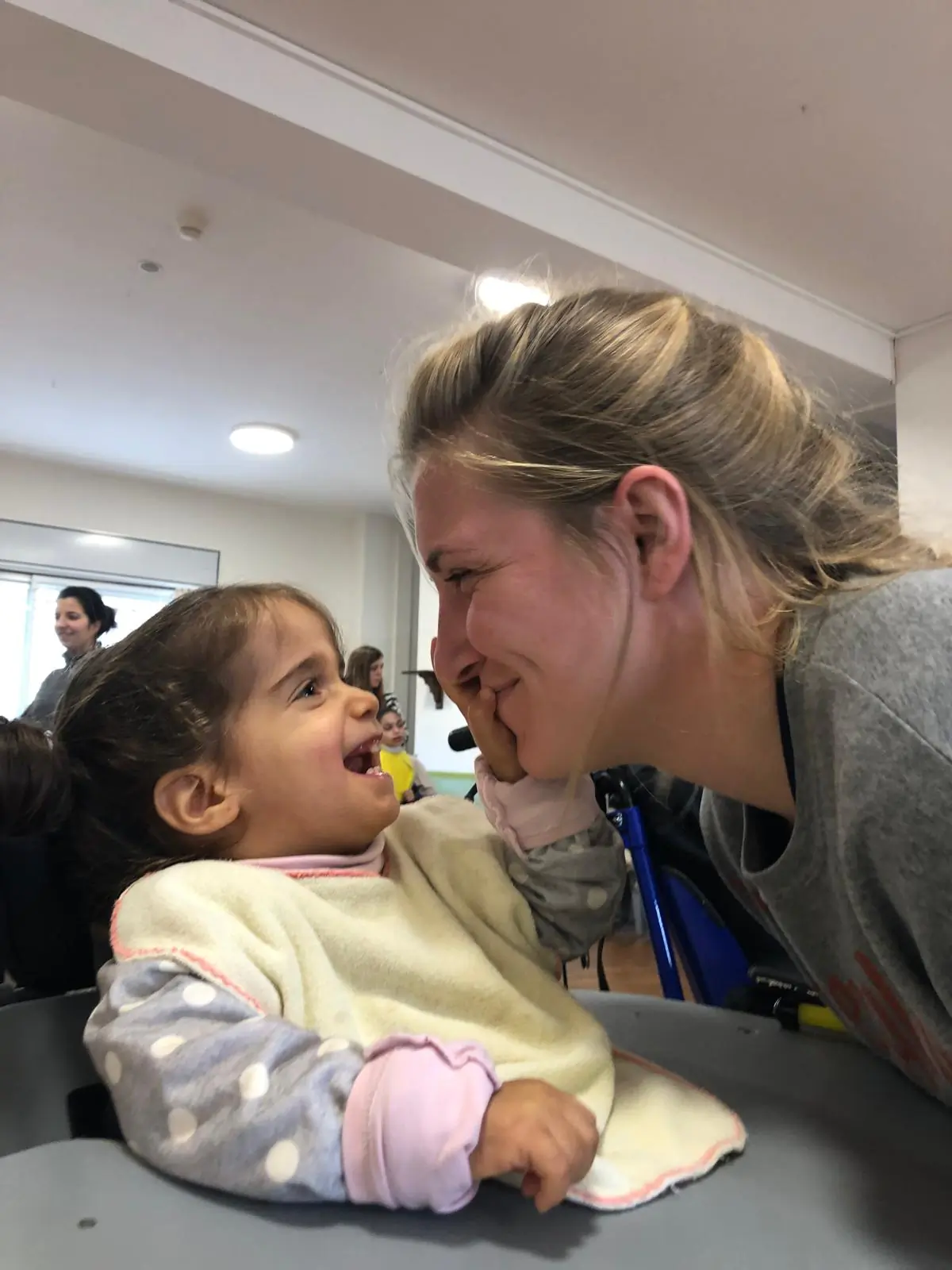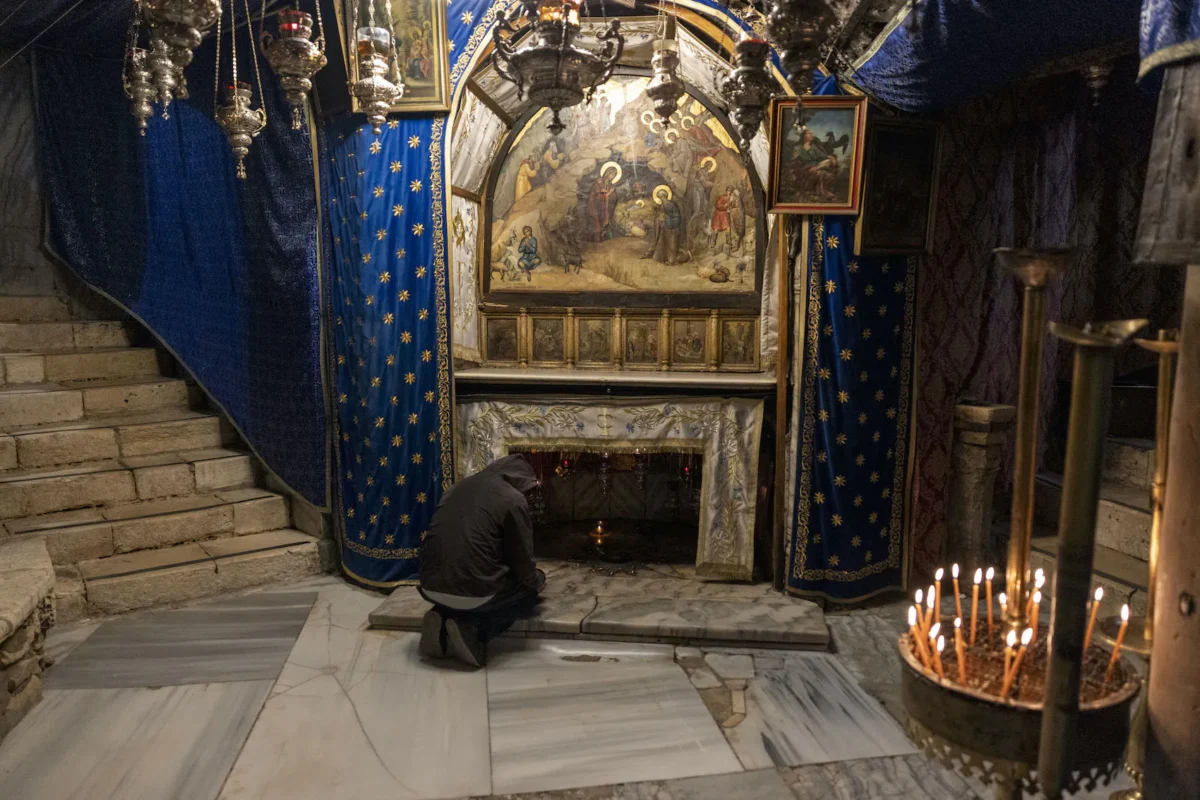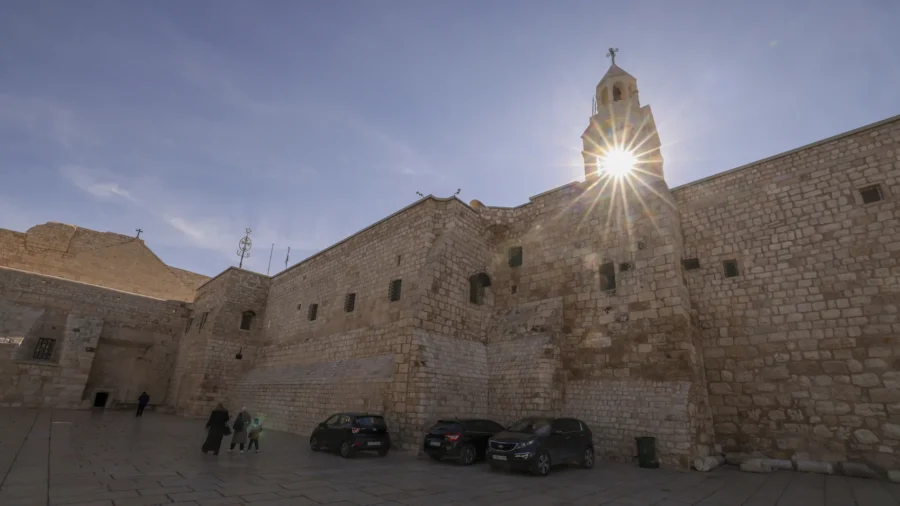Christmas in Jesus’s birthplace is a muted affair this year, with the Holy Land cloven by war. The war in Gaza rages, with thousands of civilian casualties, Israelis still held hostage, and many more back home still reeling from the Oct. 7 attacks.
Bethlehem, along the flight path of rockets Hamas in Gaza fires at Jerusalem, has seen explosions directly overhead as Israel’s Iron Dome system intercepts those missiles, an American in Bethlehem told The Epoch Times.
Leaders of major branches of Christianity called on congregations in the area “to stand strong with those facing such afflictions by this year foregoing any unnecessary festive activities.”
The center of the West Bank’s Christian population, Christmas in Bethlehem is typically a big deal, with music in the streets, lights everywhere, and shops decorated and drawing thousands of tourists.
“Each year during the sacred seasons of Advent and Christmastide, our Christian communities throughout the Holy Land take great delight in the preparations for the commemoration of the birth of our Lord and Savior Jesus Christ,” the patriarchs of the Roman Catholic, Greek Orthodox, and Armenian churches said in a joint letter on Nov. 10.
“In addition to attendance in religious services, these celebrations have normally involved participation in numerous public festivities and the large-scale display of brightly lit and expensive decorations as a means of expressing our joy at the approach and arrival of the Feast of the Nativity,” they wrote.
“These are not normal times,” the patriarchs noted. “Since the start of the war, there has been an atmosphere of sadness and pain. Thousands of innocent civilians, including women and children, have died or suffered serious injuries. Many more grieve over the loss of their homes, their loved ones, or the uncertain fate of those dear to them.
“Throughout the region, even more have lost their work and are suffering from serious economic challenges. Yet despite our repeated calls for humanitarian ceasefire and de-escalation of violence, the war continues.”
The patriarchs, in urging the avoidance of festivity this year, urged “our priests and the faithful to focus more on the spiritual meaning of Christmas in their pastoral activities and liturgical celebrations during this period, with the focus directed at holding in our thoughts our brothers and sisters affected by this war and its consequences, and with fervent prayers for a just and everlasting peace for our beloved Holy Land.”
‘There’s a War Going On’
Anat Sultan-Dadon, Consul General of Israel to the Southeastern United States, told The Epoch Times that it was the Christian leaders who decided to avoid festivities in the Bethlehem area.
“It’s not something that Israel has a stand on,” Ms. Sultan-Dadon said.
She noted that Bethlehem, south of Jerusalem in the part of the West Bank Israelis call Judea, “is ruled by the Palestinian Authority, not by Israel. It is their decision.”
Israel has always supported the right of Christian worshippers to go to Bethlehem and pray there, Ms. Sultan-Dadon said. She noted that Israelis similarly cut back their Hanukkah festivities this month. “We need to remember there’s a war going on.”
The Palestinian Authority, since taking over civil administration in the West Bank in the mid-1990s, has not been as supportive of Arab Christians’ religious rights as Israel was, she said.
Christians in Bethlehem had been from 70 to 90 percent of the population. Now it’s 10 percent or less, with exact figures hard to come by, she said.
“And the Christian population in the Gaza Strip is now next to nothing,” she said.
Tourism has generally plummeted across Israel, she said.

She decried some news coverage of Bethlehem’s cutback on Christmas. It has focused on outrage at Israel’s war against Hamas, made little mention of the Oct. 7 Hamas massacre starting it, and tends to label Hamas merely as “militants.”
“Call terror, terror,” she said. “Terror is no different because it is targeted at Jews or Israelis. We are seeing a moral failure in so many places in the media.”
Elizabeth Wellendorf, a Catholic nurse volunteering at a church-operated special-needs group home in Bethlehem, said she saw Christmas there last year.

“It was vibrant,” said Ms. Wellendorf, 27 and a native of Omaha, Nebraska. “It’s not just all the tourists. It’s the Christians in Bethlehem. Everything is decorated. There are parades every day for a week. Bands come through. There are all different kinds of celebrations—lights everywhere, trees, decorations. You can feel the coming of the king.”
In the United States, she said, “They take all the religion out of it because we can’t have Christ in Christmas. Here, it’s more okay. We’re celebrating him.”
This year, it’s different, she said, muted and somber. She understands what the patriarchs are getting at.
“This is not the time or the place to be throwing big parties,” she said.
Ms. Wellendorf, a critical care nurse, has been volunteering in the Hogar Ninos Dios group home, which has 35 special needs child and adult residents. Children who live there stay there as adults, she said.
She lives in a dorm the church provides, and the nuns at the home give her lunch. Otherwise, she receives no salary and lives off savings. Some relatives contribute to her support.
She had been working as a travel nurse, making good money, and went on a pilgrimage to the Holy Land.
“Because this is my number one place, and God called me to stay here. So I said, ‘Make a way,’ And the people I was with showed us this home for special needs children. And I decided to come.”
Her first stint was from Christmas last year to Easter. She returned in August on a one-year volunteer visa.
Ms. Wellendorf found an upside to this year’s downbeat Christmas.
“As much as I want to celebrate for the king, it’s very beautiful that we have to humble ourselves and just ask ourselves, ‘What is Christmas about?’
“It’s about God. It’s not about all these parties. It’s not about everything outside. It’s about what’s in your heart. It’s about what’s in the church. It’s about your family. So, as hard as it is not having all that outside, it’s also beautiful, being able to experience the real meaning of Christmas, where he was born.
“He wasn’t born in a time of peace. He was born in a time of war. So it’s beautiful that we can feel that.”
She’ll observe Christmas by going to Midnight Mass on Christmas Eve. “It’s celebrated in a different language every half hour. We’ll see which language I end up with,” she said.
She’ll then walk with nuns to the grotto where Jesus was born.

The next day, there will be a Christmas brunch for the volunteers and then a Christmas dinner with the group home’s residents, she said.
Ms. Wellendorf said she feels fortunate the war hasn’t cut that close to Bethlehem. She cited the missiles intercepted overhead and the sirens they heard on the morning of Oct. 7. “I thought they were tornado sirens,” the Nebraska native said. “But there’s no tornadoes here.”
The Israeli army has gone into some nearby refugee camps looking for Hamas members, she said. And Bethlehem shopkeepers participated in a one-day “Day of Anger” strike in October by shutting down their shops. Other than that, she’s seen no local unrest, she said.
She acknowledged Palestinian Christians “are hurting a lot,” in part because “they live on tourism, especially during this time of year. All the hotels here, everything is run by Christians. So it’s going to be hard. Like it’s hard for them because they’re not making any money like they normally do.”
She is impressed with the level of religion embedded in all the area’s residents—Muslims, Christians, and Jews alike. She noted Israel’s Sabbath restrictions limiting work and public transportation, with stores closed.
Sabbath-compliant elevators in hospitals stop on every floor on the Sabbath, she said. Observant Jews don’t have to push an electrical button, which is forbidden on the Sabbath.
From The Epoch Times


